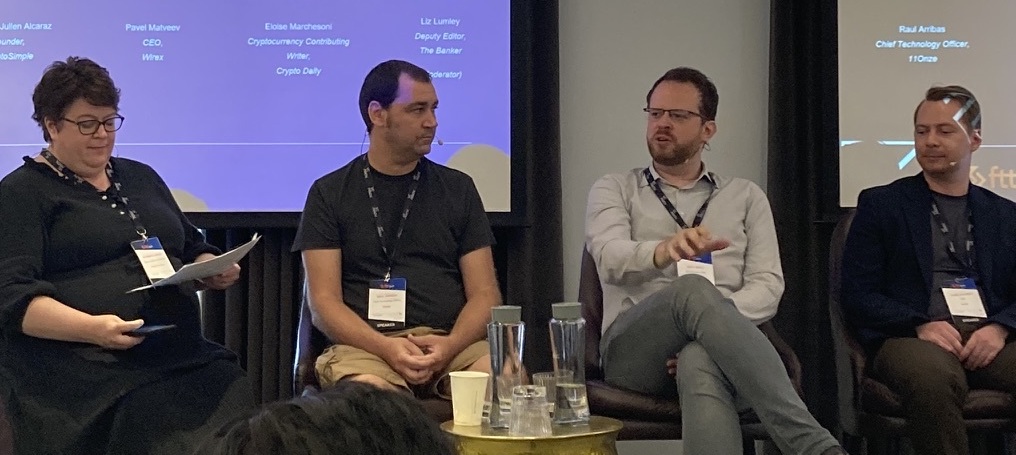FTT DeFi: A community where TradFi, CeFi & DeFi collaborate
We attended FTT DeFi on the 12th of July, taking part in an event bringing three worlds together: TradFi, CeFi and DeFi. As the pioneer of Web 2.5, Fiat Republic was delighted to be involved in discussions on unlocking value and trust between these three ecosystems. But for what purpose? Mainstreaming cryptocurrency, of course.

We were super excited for our CEO and Founder, Adam Bialy, to be involved on the main stage participating in discussion and debate on the journey to mainstreaming crypto assets. We were also pleased to attend two other talks, Bridging the gaps through effective partnerships and Building new rails for cross-border payments. Fundamentally, these three talks hit the most critical points home for developing Web 2.5: education, formal consensus, bridges, partnerships and regulation. Without these Web 2.5 enablers, there is no Web 3.
Mainstreaming Cryptoassets: Adam Bialy, CEO, Fiat Republic, was joined by Pavel Matveev, CEO, Wirex, François-Julien Alcaraz, CMO, Crypto Simple, Raul Arribas, CTO, 11Onze and Moderator Liz Lumley on the infrastructure stage to talk about mainstreaming crypto assets.
Waiting for Bitcoin: “Why is the future of finance stuck forever in the future?”
For one, the definition of adoption came under scrutiny.
Matveev: the current cyclical trends follow a single use case: speculation. Further, each historical cycle has brought more (speculation-based) users. We might then assume that the next cycle will bring mainstream speculative adoption.
There was debate about what this adoption case had to do with the broader adoption case.
Bialy called the speculative trend fadoption. “If you are exiting on every crash, you’re not an adopter – you’re a tourist.” Thus, the current dynamic is a paradox. “We use fiat to buy crypto, wait for it to appreciate, then we convert back to fiat. That step needs to fall away for mass adoption to kick in: the moment it is converted, you’re not an adopter, you’re a dropper.”
Fish tacos: overcoming obstacles: Cryptos’ passing hands, but never for payment
Consumers might use crypto in some cases but not across the entire supply chain.
Matveev: The main obstacle is price or caring about the price. The use case, merchant, cross border, machine to machine, is there and undisturbed.
Arribas: All pricing is in fiat. Pricing for products and services needs to be bitcoin. When priced in bitcoin, you don’t care about volatility. One Bitcoin is one Bitcoin.
The panel concluded that the hail and sleet from crypto winter would last for as long as payments are not crypto’s primary use. But Bialy framed the question as one of scale.
Bialy: You can pay for fish tacos using the lightning network in Miami. How did that happen? Conditions in Miami were made safe: the city recommended POS machines for specific companies as well as other control and security features. Only after that rubber stamp do you see adoption. But the fish taco stand, illustrative as it is, is not the quintessential laboratory. You need employment in a high-frequency space. High-frequency spaces are where impressions are set and behaviours are changed. So grocery shopping for fish tacos is the high mark.

Swift falling swiftly
From a technical standpoint, the panel agreed that there was no reason stablecoins, for example, could not replace swift. “The first iteration of decentralization is centralization. Swift is a 50-year-old technology, stablecoins are superior and could replace it instantly. They just don’t have trust and institutional trust, whether you like it or not, that comes from regulation,” said Bialy.
Thus we are stuck in crypto winter so long as crypto is constantly converted rather than implemented in everyday life.
Innovation, where art thou?
With the ‘Fish Taco’ moment in view, Lumley inquired whether innovation was over and we are simply twiddling our thumbs waiting for adoption. The consensus? NO! Larger conditions aren’t sufficient for peak innovation. Lumley asked the panel to elaborate.
Alcaraz: Lobbying. Part of that is forming associations and directing that into political actions. Secondly, lobbying universities to facilitate blockchain education programs.
Bialy: Regulation is education. A great book on this subject is Crossing the chasm. Firstly, we need the regulation and education barrier breached. Consequently, we need it in the hands of users… daily. It’s also vital to tamper down the attitude of crypto natives. The Satoshi Paper has been interpreted adversarially against governments & regulators. But in the next ten years, if it’s going to work, it will work because of partnership rather than conflict.
On the other hand, political operations of influence seem overwhelming for this nascent industry. Yet this is why effective partnerships ought to begin at home. Otherwise, without effective partnerships and in-roads, DeFi is stuck. From there, the industry can more strongly conceptualise building political highways of influence.
Bridging the gaps through effective partnerships: Sean Kiernan, Chief Executive Officer, Greengage; Ana Maria Jipa, Co-Founder & CEO, Olyn Ash Bhatia, CEO, Shipyard Innovation; Nick Holt, Senior Director, Solutions Engineering, Marqeta (moderator).
A central theme relating to the earlier discussion was Approaching partnerships when building new ventures. Topics covered include identifying the developer side of fadoption, education in terms of bridging divides – in this case between industries rather than governments – and, lastly, being part of a larger network rather than a siloed adversary.
As with fadoption, Bhatia warned against innovation tourism. He suggested asking whether the innovation necessitates a decentralised approach or if the potential partner is creating a solution in search of a problem. “DeFi, Web3…these are all just tools. So there’s no reason to treat it differently to any other product innovation journey,” said Bhatia.
As Olyn pointed out, when building a novel intersection between industries, different industries interact when they ordinarily wouldn’t. Thus, just as retail requires education: so do legacy businesses. Next, networked adoption at the institutional level requires conceptualising the international context of standards and practices. Olyn laid out two steps:
1. clarify for international leaders what it takes to orchestrate interoperability and why its required for innovation at the highest level
2. persuade them to overcome the thought of “pure ownership” over the whole flow of the visibility of the tech. Customer intimacy is the core product.
Lastly, the question of developing in terms of a network of other services came up:
Sean: Ask yourself where you need to build and where you need to bridge.
In traditional banking, they build from scratch. Spaghetti tech doesn’t work well. Sometimes some elements of your product should be chosen through market forces.
In our case, we’re building a platform where we work with third-party providers – the platformization of banking hasn’t happened yet.
The panel Building new rails for cross-border payments brought the above discussion to a climax. Daniel Belda, Head of Product Strategy, OpenPayd, Jamie McNaught, Founder and CEO, Solidi Manuela Sedvartaite, Innovation Manager, Banco Santander Liz Lumley, Deputy Editor, The Banker (moderator).
Key topics included challenges for cryptocurrency to beat swift and fiat headaches regarding compliance and understanding.
Why has Swift not fallen swiftly: fiat headaches
The panel was in agreement that everybody that makes cross-border payments hates it. In terms of a viable solution for crypto, “It needs to be like an IKEA set: we need crypto, banks and cards to all work with each other”, said Belda.
Sedvartaite also echoed Adam Bialy’s earlier statements about the end of the adversarial age “[The solution] doesn’t have to be the destruction of [traditional finance]. If anything, the pandemic forced compliance departments to lean more digital. We also see [collaborations like] Circle foundation collaborating with remittance companies.” However, the current state of compliance is many floors below ideal “the amount of compliance checks we have to clear is inordinate ”. The hesitation is owing to education on “the consumer, corporate and regulator level. Scaling is stuck because of these ambiguities,” concluded Sedvartaite.
Education, finally, regards norms. Chiefly, developing international standards and practices. For example, technical shortfalls aside, SWIFT “‘works’ because of international standards. Clearly, it’s just a messaging service haphazardly bolted on correspondent banking,” Mcnaught said, which is crazy in contrast to using cryptocurrency, “which is moving the actual asset around, in some instances instantly.” Even in terms of risks, Mcnaught emphasised that cryptocurrency is superior because there is no risk of counterparty default.
FTT DeFi 2022 was jam-packed with lively discussion across four stages – and we’ve only covered three from the infrastructure stage. Nonetheless, the topics which came up could not be more significant. The fact that a 50-year-old technology such as SWIFT, for example, has not been replaced by cryptocurrency is shocking. More shocking, however, is the failure of many to recognise the core reasons why: education, trust, compliance and integrated solutions that allow for developing international standards that institutions and nations can get behind. Similarly, whilst swift is just one part of value transfer, those findings can be extrapolated to other areas. As our CEO Adam Bialy pointed out, for example, actual adoption and scaling require integration in every sense of the term beyond just the tech itself: for a start, socially and legally, to name only two.
Fundamentally, that is the mission of the Fiat Republic’s fiat-as-a-service platform. We are solving all of these critical fiat headaches. Whether it is the practicalities of optimising compliance, facilitating cross-border or FX exchange, or even the technicalities of unlocking all of your fiat needs through a single API. Additionally, we regard the political and regulatory components of mainstreaming cryptocurrencies as equally important. That’s why we’ve set up the Fiat republic consortium, more on that to come soon.
Learn more about how Fiat Republic is building the only fiat API crypto platforms need to deliver better user experiences and streamline payment operations.
P.s also be sure to check out our Crypto Legends podcast, where you’ll discover the best innovation stories from the crypto platforms of Web3!
We would love to hear from you — connect with us on LinkedIn, Twitter



